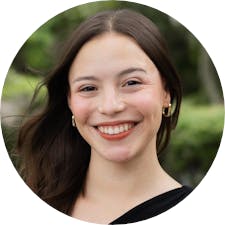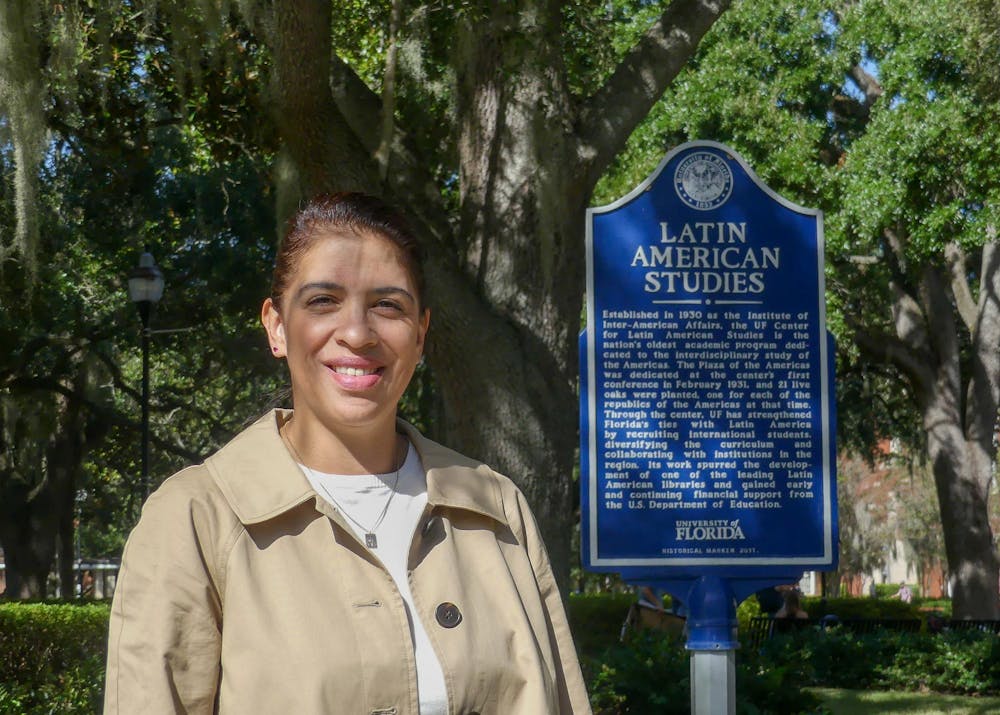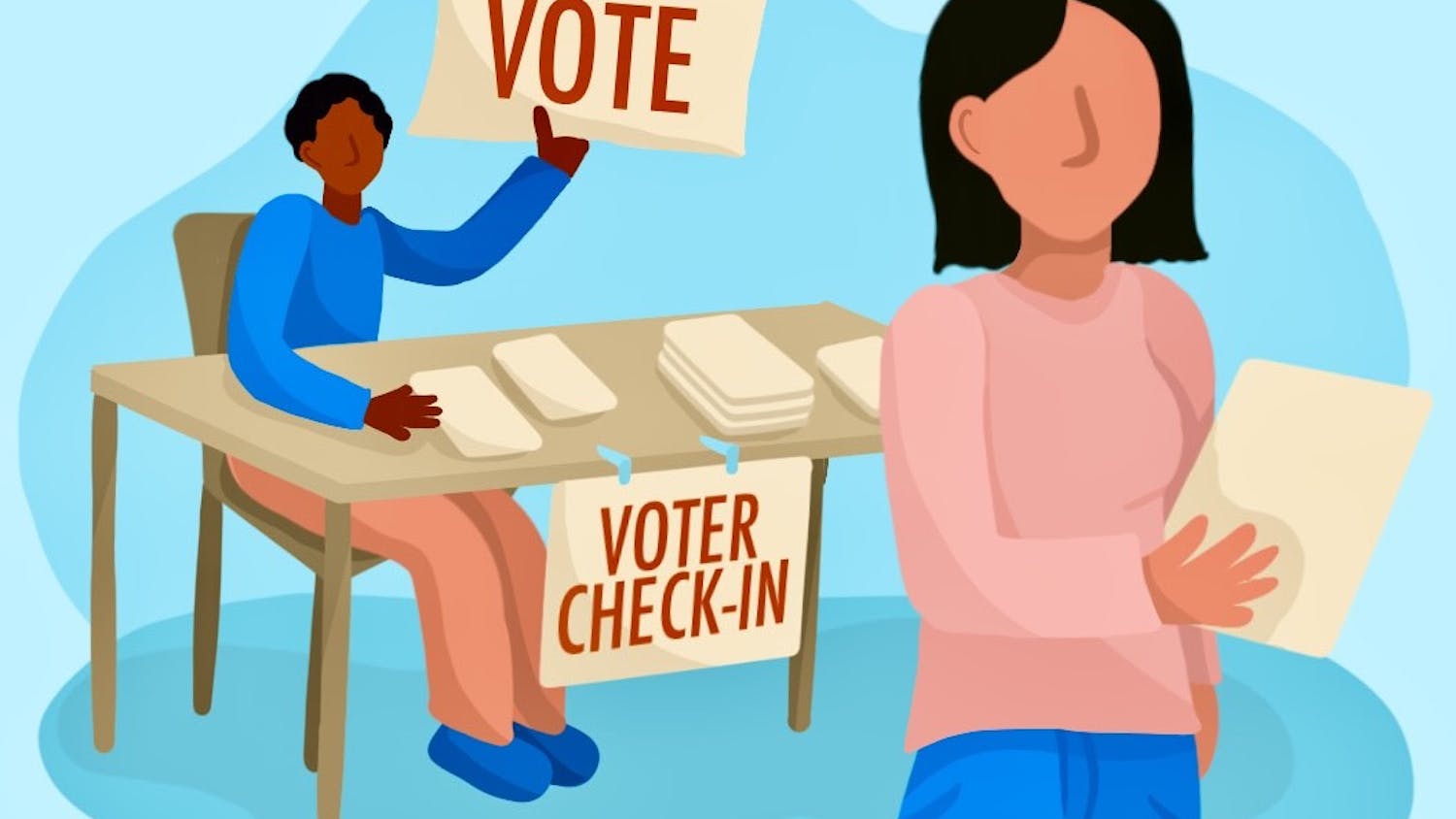Read in Spanish here.
Inside a small room filled with books and folders, Eva Siomara Sosa Pérez speaks with calm determination — though her voice still carries the echo of an unfinished battle.
“I want to go back to Guatemala,” she said with a tired smile.
Sosa is a former anti-corruption prosecutor and current political exile. She’s been accused of obstructing justice and spent time in prison. Now, she’s part of an academic residency at UF, where she studies the English language.
The space has allowed her to realize another ambition — writing a book — while reflecting on democracy and human rights in Central America.
Investigating corruption
Sosa played a key role in investigating corruption and drug trafficking at the International Commission against Impunity in Guatemala.
In 2015, through a drug trafficking case file, Sosa stumbled upon what would become the “La Línea” investigation. The investigation reached the country’s most powerful political and economic elites, marking a turning point not only in her career but in Guatemala’s recent history.
The corruption case involved the highest-ranking officials of the country: former President Otto Pérez Molina and former Vice President Roxana Baldetti.
The commission’s reports uncovered an intragovernmental customs fraud scheme, with those involved allegedly pocketing at least $3.5 million. After weeks of mass protests outside Guatemala’s National Palace, Pérez Molina resigned. He faced trial in 2022, receiving 16 years in prison for illicit association and customs fraud.
“Everything I did, I did convinced it was the right thing,” Sosa said.
In November 2023, the former president paid a little over $38,000 in bail to convert his prison sentence to probation.
For Sosa, that case was only the beginning of a series of investigations that would expose other major corruption scandals. Another prolific example, the Odebrecht Case in 2018, was linked to more than $17.9 million in bribes to secure a public works contract.
After the commission where Sosa worked was dismantled in 2019, she was reassigned to smaller units in the Public Ministry. But she continued receiving threats and attacks for her investigative work, later describing feeling “hunted” and “harassed.”
Then, in February 2022, a Guatemalan court issued an arrest warrant against Sosa for obstruction of justice. She was detained and taken to Mariscal Zavala Prison in Guatemala.
Ricardo Méndez Ruiz, the son of a former military commander accused of war crimes, leads the foundation that filed the complaint.
“They never imagined this would reach the highest levels of government and the economic elite,” Sosa recalled, sitting in an office at the Center for Latin American Studies.
On trial
Sosa described the court hearings as tense and emotionally draining, often delayed by procedural maneuvers from Guatemala’s Public Ministry. On several occasions, she said, she faced misogynistic attacks, like being called a “bad mother.”
“They don’t have real investigations,” she said. “Democracy stops being democracy when all three branches of the state align behind specific interests.”
Méndez Ruiz even told her, “That’s what happens when you leave the kitchen,” she said.
Despite the insults and persecution, Sosa found ways to endure.
“At night, when I was alone, I would write. … I wrote down everything I heard there — even the guards’ conversations,” she said.
Other attorneys often hesitated to take cases for former prosecutors like Sosa, said Claudia González Orellana, a former commission official. González played a crucial role in defending Sosa’s colleagues, until she herself was arrested and spent 81 days in prison.
“No one wanted to take their cases because the atmosphere was so intimidating … there was a lot of fear,” she said.
During that time, Sosa’s sister, Teresa Sosa Pérez, became her emotional anchor and link to the outside world. Teresa, a 51-year-old Guatemalan lawyer, carried her sister’s letters back and forth. Corruption wounded and fractured her family and others, she said.
“The challenge is that this experience, this ordeal, completely disfigured our family dynamics,” Teresa said.
Sosa’s younger son, Héctor Francisco Hernández, remembers that period as devastating yet revealing of his mother’s resilience.
“My mom is the kind of person who never stays silent — if she feels something, she says it. And if she says, ‘I’m going to fight for this,’ she does,” he said.
Coming to Gainesville
In December 2022, after the sentencing of one of the former prosecutors, Virginia Laparra, Siomara realized her safety in Guatemala was at risk. She left the country for Mexico, where she sought political asylum and began a new chapter as an exile.
The UF program hosting her, Central America in Ascenso, seeks to protect scholars and human rights defenders who have been persecuted in their countries, offering them a safe space for reflection and research. The program was funded by USAID until February 2025, when funding cuts were announced, creating uncertainty about its future.
At this point, Sosa was already in Gainesville, ready to begin the program, and UF and the Center for Latin American Studies decided to take its financing to ensure its continuation.
“To be able to support someone who’s committed to democracy, human rights and honesty in the public sector, that’s very important to us,” said Carmen Martínez Novo, a professor at the Center for Latin American Studies.
Sosa’s presence at UF provides students with the opportunity to understand the human cost of defending justice, Martínez Novo said.
From exile to her residence at UF, Sosa continues to write and participate in academic forums where she shares her experience with students and faculty.
Next year will be decisive for Guatemala: the country will appoint new high court magistrates and a new attorney general — processes that could determine the political and judicial direction of the nation for the next five years, and perhaps open the door for Sosa and her former colleagues to return.
“I believe citizen oversight and public accountability are what can truly empower us — always trying to expose what’s true,” she said.
As she closed her notebook and prepared to walk through UF’s hallways, Sosa smiled wistfully. She still dreams of going home.
Contact María José Cordero in mcastillo@alligator.org . Follow her on X @marprofundo___.

María José Cordero is a contributing writer and a political scientist currently in her first year of a master’s program in Women’s Studies, Gender and Sexualities. She has a keen interest in feminist perspectives and the intersections of politics and social change. In her free time, she enjoys outdoor activities, soaking up the sun and spending time in nature.






